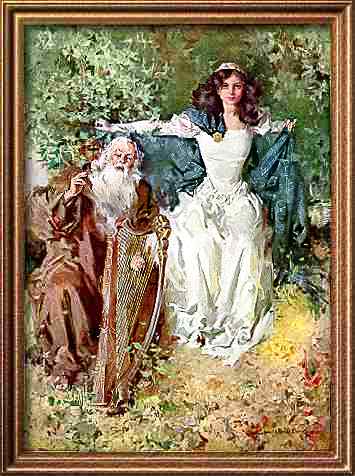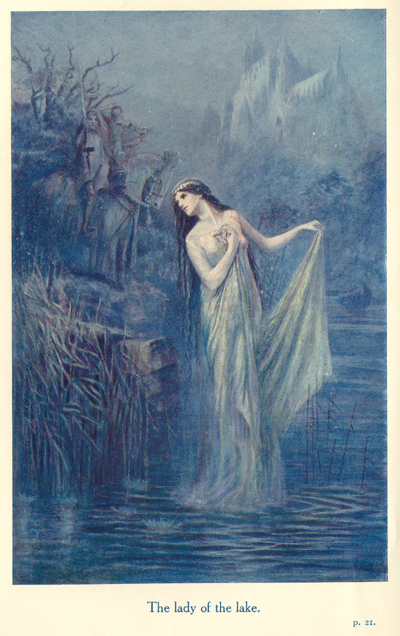 |
| Arthur receiving Excalibur |
The Lady of the Lake is a generally recognized role in the tale of King Arthur's reign, granting him the most supernatural sword in any myth, Excalibur, in relatively unconventional and intriguing way. After reading Rosenberg's account of King Arthur, we know that Arthur first spied Excalibur being held above the dark waters in the center of a lake by an unclaimed hand and that the Lady of the Lake rowed to the shore where Arthur stood to take him to it. To me, this bizarre encounter seemed rather brief and unexplained for all its randomness so I just chalked it up to Rosenberg's summary-style writing for her book since she has to fit quite a few myths into it, but then I remembered having read the 700 page version of the same storyline (The Once and Future King by T. H. White) that it didn't go into much detail in describing that aspect of the myth either, so I decided to do some research of my own:
 |
| The Lady and Merlin |
According to a website I stumbled upon detailing less known facts of Britain's history, the Lady of the Lake did play a bigger role in King Arthur's life than what is most commonly known today. We know through out studies of "the goddess" that they once played a monumental role in most all myths throughout the world, but there came a period where they were overthrown and put on the back burner once the god gained more power and prominence, the Lady of the Lake was no different. In Celtic culture water deities were extremely popular as they were thought to control the essential essence of life itself, a wide variety of names she is known by (including Nimue or Vivienne to the Celtics and Mneme or Mnemosyne to the Romans) indicate that she is recognized as the Water-Goddess of the Celtics or one of the nine water-nymph muses of the Romans and Greeks, who also gave weapons to the hero Perseus. She was worshipped throughout the Western Roman Empire, in Britain, the Narbonne area of Gaul, and North-Western Iberia.

In earlier versions of King Arthur (before the reign of the goddess came to an end), the Lady of the Lake not only granted Arthur power to Excalibur but apparently was the foster-mother of Sir Lancelot after the death of his father and having raised him beneath the murky waters of her lake, hence his name Lancelot of the Lake. Another early role of hers was essentially replacing Merlin, or Myrddin, as the King's druidic advisor. Merlin and the Lady first met quickly fell in love at the Fountain of Brittany, Merlin agreed to teach her all of his magical powers while the Lady became his scribe, recording all his prophesies, in addition to being his lover. But over the years the Lady became even more powerful than Merlin thanks to his teachings and imprisoned him in Glass Tower (basically a dungeon), and took over to some extent Merlin's role at Arthur's side; in these versions, Merlin's removal as King Arthur's advisor was considered the biggest contribution to his downfall. The fact that Merlin is scarcely or not at all mentioned for the latter two-thirds of the story makes sense considering that was the period that the Lady took over as Arthur's adviser and those parts were cut out.


 In earlier versions of King Arthur (before the reign of the goddess came to an end), the Lady of the Lake not only granted Arthur power to Excalibur but apparently was the foster-mother of Sir Lancelot after the death of his father and having raised him beneath the murky waters of her lake, hence his name Lancelot of the Lake. Another early role of hers was essentially replacing Merlin, or Myrddin, as the King's druidic advisor. Merlin and the Lady first met quickly fell in love at the Fountain of Brittany, Merlin agreed to teach her all of his magical powers while the Lady became his scribe, recording all his prophesies, in addition to being his lover. But over the years the Lady became even more powerful than Merlin thanks to his teachings and imprisoned him in Glass Tower (basically a dungeon), and took over to some extent Merlin's role at Arthur's side; in these versions, Merlin's removal as King Arthur's advisor was considered the biggest contribution to his downfall. The fact that Merlin is scarcely or not at all mentioned for the latter two-thirds of the story makes sense considering that was the period that the Lady took over as Arthur's adviser and those parts were cut out.
In earlier versions of King Arthur (before the reign of the goddess came to an end), the Lady of the Lake not only granted Arthur power to Excalibur but apparently was the foster-mother of Sir Lancelot after the death of his father and having raised him beneath the murky waters of her lake, hence his name Lancelot of the Lake. Another early role of hers was essentially replacing Merlin, or Myrddin, as the King's druidic advisor. Merlin and the Lady first met quickly fell in love at the Fountain of Brittany, Merlin agreed to teach her all of his magical powers while the Lady became his scribe, recording all his prophesies, in addition to being his lover. But over the years the Lady became even more powerful than Merlin thanks to his teachings and imprisoned him in Glass Tower (basically a dungeon), and took over to some extent Merlin's role at Arthur's side; in these versions, Merlin's removal as King Arthur's advisor was considered the biggest contribution to his downfall. The fact that Merlin is scarcely or not at all mentioned for the latter two-thirds of the story makes sense considering that was the period that the Lady took over as Arthur's adviser and those parts were cut out.
This is some good digging - the stories are so much more interesting when you have the time to find out the 'whole' story. Marion Zimmer Bradley is a contemporary author who has tried to put the Lady of the Lake back in her rightful place with "The Mists of Avalon." I always wonder what the stories were like originally before they were even written down. Pretty intriguing.
ReplyDeleteI definitely think so too. Thanks for the reference, the legends of King Arthur have always captivated me and I absolutely love The Once and Future King. It sad indeed to think about how even myths, often a glipse into the foundation of a culture, succum to censorship and the 'politics' of writing..
ReplyDelete